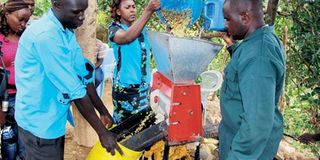Coffee farmer reaps a fortune in arid Baringo

Chepsoiyo and his wife, Albina, remove husks from coffee berries harvested at their farm. Farmers have borne the brunt of mismanagement and wrangles that have dominated this sector. PHOTO | JARED NYATAYA |
What you need to know:
- The venture is earning him handsome returns amounting to Sh1.2 million every year.
- The hot climate in the area has been an advantage as it favours coffee farming.
When he swapped maize farming for coffee business in 1998, Mr Joshua Chepsoiyo, 44, from arid Poi area in Baringo North sub-county was not certain he would make it in the new field.
However, this has turned out to be the turning point of his life as the venture is earning him handsome returns amounting to Sh1.2 million every year.
The father-of-four now has more than 6,000 coffee trees on his seven-acre piece of land, making him the envy of the village where perennial food shortages are the norm.
The hot climate in the area has been an advantage as it favours coffee farming.
SUPPLEMENT INCOME
Mr Chepsoiyo runs the enterprise with his wife, Albina Toroitich. He also practises fruit farming, zero grazing, and poultry and dairy goat farming to supplement his income.
“I used to incur a lot of expense farming maize by leasing farms in Uasin Gishu, yet I was not getting maximum returns due to low prices and erratic rainfall. I had to think outside the box. I’m happy my decision is paying off,” Mr Chepsoiyo says.
He, however, cites poor road network in the area as a major challenge when taking produce to the market and the high cost of fertiliser and pesticides.
He says he also incurs great expense transporting fertiliser from Kabarnet, spending about Sh4,700.
SUBSIDISED FERTILISER
“The government should provide subsidised fertiliser, as the commodity has run out at National Cereals and Produce Board (NCPB) depots. We were benefiting a lot as NCPB was selling fertiliser at Sh2,200 a bag,” he says.
Mr Chepsoiyo, who harvests more than 35,000kg of coffee a year, has planted various varieties, including Ruiru 11, which can be harvested throughout the year.
To minimise the effects of the scorching sun and provide a shade to his crops, he has planted trees at the edge of the farm. He employs six people and hires more than 15 during harvest time.
The enterprise has helped him built a permanent house and take his three children to good schools.
One of the children has just completed university, thanks to proceeds from the venture.
There is no turning back for the enterprising farmer as he has now set his eye on buying more land to expand his business.
Mr Chepsoiyo is a role model to many people in the village and many field events have been held on his farm, with visits by Baringo Governor Benjamin Cheboi and members of the county executive team.
Mr Chepsoiyo says he developed an interest in coffee farming after attending agriculture seminars. He has a lot of literature on coffee farming.
He says he used to remove coffee husks manually, which took a long time, but now he has bought a Sh50,000 coffee grinding machine.
The farmer, who at one point served as a private veterinary officer in Kipsaraman division, takes his produce to Coffee Management Services (CMS) factory in Eldoret using a lorry. He makes about Sh700,000 profit a year after expenses.
He and other farmers in Baringo will soon have a reason to smile after the county government rolled out a refurbishment plan for all major rural roads.
The county government set aside more than Sh244 million in the last financial year for water and irrigation projects to boost food security. Twelve irrigation schemes and 109 water projects will be set up.
RAISE WATER COVERAGE
The county executive in charge of water and irrigation, Mr Job Tomno, says the projects will raise water coverage in the county from the current 35 per cent to 49 per cent.
The county government has put more than 6,500 acres under irrigation, he says, and is targeting 8,000 acres in the next three years. The county has a potential of 150,000 acres.
County agriculture and livestock executive Luka Rotich says livestock and bee keeping have been the economic mainstay of the area. “But reliance on rain-fed agriculture has frequently led to drought and crop failure,” he says.
He adds that the 6,500 acres currently under irrigation can produce half the county’s food requirements. The county needs one million bags of maize annually to feed its more than 500,000 people.
“We want to build the people’s capacity to be self-reliant in food production,” says Mr Rotich.




